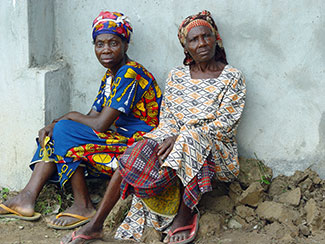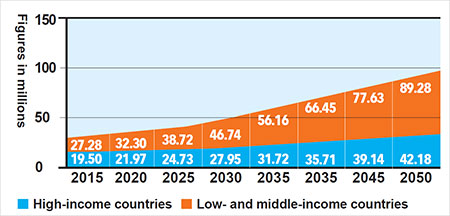
Tackling the growing, global burden of dementia
September / October 2018 | Volume 17, Number 5

©2003 Shehu Danlami Salihu, Courtesy of Photoshare
Eldery women in Nigeria.
By Shana Potash
Every 3 seconds, somewhere in the world, there’s a new case of dementia, according to Alzheimer’s Disease International (ADI). One of the most burdensome conditions, dementia robs people of their memories, reasoning and independence and takes a staggering physical, emotional and financial toll on the individual, their family and society at large. Many experts are predicting a global epidemic that is expected to hit low- and middle-income countries (LMICs) particularly hard.
Dementia is an umbrella term for several diseases that, for the most part, cause progressive changes in the brain that can affect thinking, behavior and the ability to perform even simple, everyday tasks. Alzheimer’s disease, the most common form, is believed to account for 60-70 percent of all cases. Increasingly, evidence suggests a combination of genetic, lifestyle and environmental factors influence the risk of dementia and how it progresses. With that, scientists are moving beyond a one-size-fits-all approach and are examining the heterogeneity of disease - how Alzheimer’s and related dementias differ among individuals and across groups.
Researchers throughout the world are coming together to discover new or better interventions to delay, treat or prevent dementia. And they’re studying how to support the wellbeing of family members who may experience anxiety, depression and other challenges as they tend to a loved one who needs round-the-clock care.
Global dementia is forecast to rise
dramatically by 2050

Source: Alzheimer’s Disease International: World Alzheimer Report 2015
“This is a critical time in Alzheimer’s research, with new opportunities to build upon what we have learned,” said Dr. Richard Hodes, director of NIH’s National Institute on Aging (NIA). Equipped with increased federal funding and guided by recommendations resulting from regular stakeholder summits, NIA is leading the U.S. government’s research effort to prevent and effectively treat Alzheimer’s and related dementias by 2025, a goal of the National Plan to Address Alzheimer's Disease, established in 2012. “We must continue to foster creative approaches that leverage emerging scientific and technological advances, establish robust translational infrastructure for rapid and broad sharing of data and research tools, and work with funding partners and other stakeholders to cultivate and sustain an open science research ecosystem.”
NIH is supporting several international research collaborations to find treatment and prevention solutions, identify risk and protective factors, and collect comparable data that would enable analysis of worldwide trends. Also, a number of research and capacity building projects in LMICs have been supported through Fogarty’s brain disorders program, with funding from across NIH. To encourage more collaboration and coordination, NIA and the Alzheimer’s Association developed a database of publicly and privately funded research around the world, the International Alzheimer’s Disease Research Portfolio (IADRP).
Noting that only 15 percent of World Health Organization member states have a national plan to address dementia, WHO last year produced a global action plan that calls for a doubling of the output of global research on dementia by 2025.
More Information
- National Institute on Aging (NIA) at the NIH
- NIA Open Science, Big Data, and You: Working Together to Treat and Prevent Alzheimer’s Disease and Related Dementias, published July 30, 2018
- NIA International Alzheimer’s Disease Research Portfolio
- Global action plan on the public health response to dementia 2017-2025
World Health Organization, published 2017
Resources and publications related to the article Study in India sets stage for US tests of screening tool for cognitive impairment:
- Related NIH-supported projects in NIH RePORTER:
- 5-Cog Battery to Improve Detection of Cognitive Impairment and Dementia supported by NINDS
- Kerala-Einstein Study: Risk Factors for Cognitive Decline supported by NIA and Fogarty
- Kerala-Einstein Study: Healthy Lifestyle, Vascular Disease, and Cognitive Decline supported by NIA and Fogarty
- Related publications:
- Picture-based memory impairment screen for dementia
Journal of the American Geriatrics Society via PubMed, November 2012 - Picture-based memory impairment screen: effective cognitive screen in ethnically diverse populations
Journal of the American Geriatrics Society via PubMed, May 2018
Resources and publications related to the article Brazilian brains focus of Alzheimer’s genomics research:
- Related NIA-supported project in NIH RePORTER:
African ancestry and the genomic architecture of AD and other common neurodegenerative disease neuropathologies - A way to withstand Alzheimer’s disease is in sight
Rush University Medical Center news, April 23, 2018
Resources and publications related to the article Fogarty grantees receive supplemental funding for training in Alzheimer’s disease and related dementias:
- Related NIH funding notice: Alzheimer's Disease and its related Dementias (AD/ADRD)-focused Administrative supplements for NIH grants that are not focused on Alzheimer's disease (NOT-AG-18-008), released April 12, 2018
Resources and publications related to the article As dementia rises in Africa, urgent need for research:
- Dementia in sub-Saharan Africa
Alzheimer’s Disease International, September 2017 - Related NIA-supported projects in NIH RePORTER:
Indianapolis-Ibadan Dementia Research Project - Related Fogarty-supported project:
University of Ibadan MEPI Junior Faculty Research Training Program - Brain disorders across the lifespan: Research to achieve nervous system health worldwide
Nature supplement, November 19, 2015 - Related news: NIH-led effort details global brain disorders research agenda in Nature supplement
Nov/Dec 2015 Global Health Matters
To view Adobe PDF files, download current, free accessible plug-ins from Adobe's website .





















.png)












No hay comentarios:
Publicar un comentario